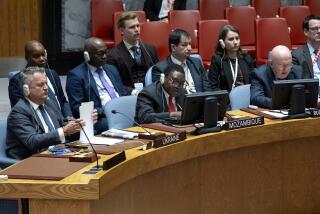Rice, Russians Disagree on Iran
- Share via
MOSCOW — Secretary of State Condoleezza Rice failed to win support from Russia on Saturday for hauling Iran before the U.N. Security Council because of its nuclear program, but she said that option remained open “at a time of our choosing.”
Washington and its European allies are waiting to see if Iran will return to diplomacy. If not, they say they will invoke the threat of economic penalties or other punishment from the Security Council.
After hastily arranged and lengthy meetings with Russian President Vladimir V. Putin and his foreign minister, Rice said Moscow was trying to push Iran back to the bargaining table.
But there was no sign that Russia was prepared to back an effort to have the International Atomic Energy Agency refer Iran’s case to the Security Council. Rice tried putting the best face on Russia’s preference to keep negotiating.
“It’s quite obvious that if it doesn’t work, then the Iranians are going to have to be referred to the Security Council,” she told reporters on her flight from Moscow to London, where she was holding talks with the British on Iran and other issues. “We’re going to keep open the prospect, the path, of referral at a time of our choosing,” Rice said.
Russia’s foreign minister, Sergei V. Lavrov, said the Iranian nuclear question could be handled through the United Nations’ nuclear watchdog agency, which is already monitoring Iran.
“We think that the current situation permits us to develop this issue and do everything possible within the means of this organization, without referring this issue to other organizations now,” Lavrov said after meetings both in a large group of U.S. officials and with Rice.
Even if the U.S., Britain, France and Germany won a vote at the IAEA to send Iran before the Security Council, it is not clear whether any tough measure would ensue. Russia and China, members of the Security Council with veto power, have said they do not want to see the Iranian case come there.
The IAEA plans to next take up the Iran question Nov. 24. Rice would not attempt to predict how Russia might vote.
Washington, which has no diplomatic relations with Iran, long has contended that Tehran is hiding a bomb-making project behind a legitimate program to develop civilian nuclear power stations.
Russia is helping Iran build one part of that civilian program, but the deal does not give Tehran full access to nuclear technology that could be diverted for weapons. Rice said that arrangement shows Russia shares global alarm about Iran’s intentions.
Britain, France and Germany have led talks with Iran over ending disputed portions of its nuclear program in exchange for economic incentives. Iranian officials rejected a proposed deal that, like the Russian model, would have kept some parts of the nuclear energy process off-limits.
More to Read
Sign up for Essential California
The most important California stories and recommendations in your inbox every morning.
You may occasionally receive promotional content from the Los Angeles Times.













